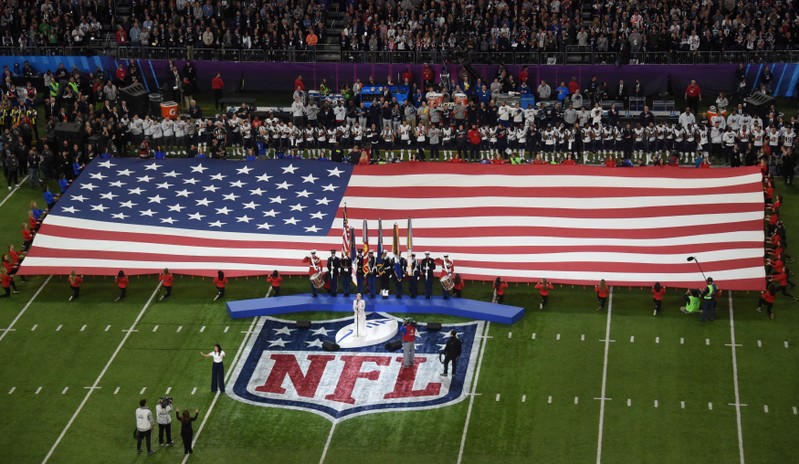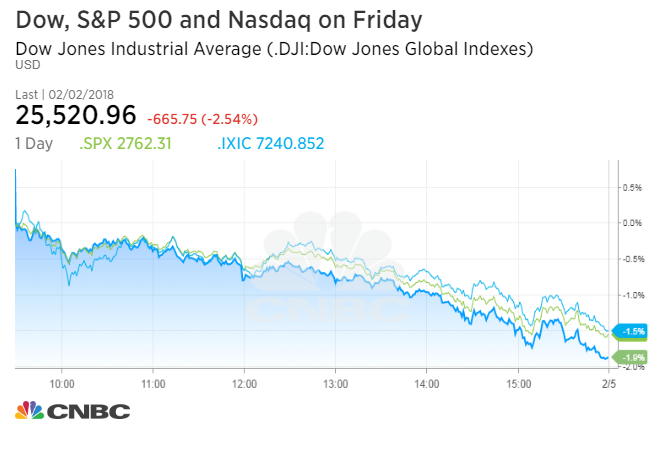
Feb 4, 2018; Minneapolis, MN, USA; Recording artist Pink sings the National Anthem before Super Bowl LII between the New England Patriots and the Philadelphia Eagles at U.S. Bank Stadium. Mandatory Credit: Richard Mackson-USA TODAY Sports
February 5, 2018
By Chris Kenning
MINNEAPOLIS (Reuters) – Super Bowl Sunday turned out to be a bye week for on-field protests, with none of the players kneeling or raising a fist during the national anthem, allowing the NFL’s biggest day to unfold without the season’s most polarizing issue at center stage.
The absence of protests before the game pleased many fans, who either saw the kneeling players as being disrespectful to the flag and the military, or were simply sick of the season-long rancor over the protests over racial injustice.
“I’m glad they stood for the anthem,” said Kelly Erickson, an Eagles fan who traveled to Minneapolis from her hometown Philadelphia.
“It’s not appropriate,” she said, referring to the protests that began in 2016 with former San Francisco quarterback Colin Kaepernick and were joined by dozens of players around the league this season.
President Donald Trump, for one, was a harsh critic of the pre-game gesture, heaping scorn on the protesting players and the league for allowing them to go unpunished.
But others were disappointed that the Eagles and Patriots did not kneel during the Star Spangled Banner, performed by the singer Pink, as they were hoping to see the issue of police treatment of minorities pushed to the forefront on the most visible stage in American sports.
“All eyes are here,” said Mel Reeves, a Minneapolis civil rights activist who organized a two-day “Take a Knee” conference that culminated in a protest rally Sunday outside U.S. Bank Stadium. “When the players are doing it, people have to pay attention to the issue.”
But the wave of protests started to fizzle late in the season when the National Football League said it would donate $89 million over seven years to social justice causes as part of an effort to end the on-field demonstrations.
Philadelphia Eagles safety Malcolm Jenkins, who has previously raised his fist above his head, was one of those who stopped his protests.
Still, Trump stirred the issue anew last week during his State of the Union address. As the season was getting underway, he said any player who protests is a “son of a bitch” who should be removed from the field, and criticized NFL owners for failing to take action.
NFL Commissioner Roger Goodell has praised the protesters as concerned activists and said the league should work with them to address their concerns, which include the use of lethal force against minorities and racial disparities in the justice system.
Trump declined to be interviewed for the Super Bowl broadcast as some previous presidents have, NBC said.
Inside U.S. Bank Stadium, some fans said they were relieved that politics did not intrude before the Super Bowl.
But a few blocks away, several dozen protesters held signs with the word “kneel” and briefly knelt together to protest police violence against black people.
The NFL has suffered from falling viewership ratings this season and some have said that the controversy over the protests may have contributed to a decline.
The NFL Players Association has disputed that, but a recent CNBC poll found that a quarter of respondents who said they would not watch the Super Bowl on Sunday said the reason was that football had become too political.
Greenville, South Carolina, restaurant owner David McCraw told Reuters he would refuse to show Sunday’s game at his establishment because the protests were still allowed.
“It’s disrespectful,” he said.
(Reporting by Chris Kenning; Editing by Frank McGurty and Susan Thomas)

